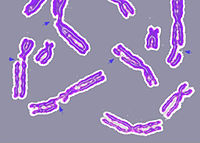
Photo from wikipedia
Similar molecular and genetic aberrations among diseases can lead to the discovery of jointly important treatment options across biologically similar diseases. Oncologists closely looked at several hormone-dependent cancers and identified… Click to show full abstract
Similar molecular and genetic aberrations among diseases can lead to the discovery of jointly important treatment options across biologically similar diseases. Oncologists closely looked at several hormone-dependent cancers and identified remarkable pathological and molecular similarities in their DNA repair pathway abnormalities. Although deficiencies in Homologous Recombination (HR) pathway plays a significant role towards cancer progression, there could be other DNA-repair pathway deficiencies that requires careful investigation. In this paper, through a biomarker-driven drug repurposing model, we identified several potential drug candidates for breast and prostate cancer patients with DNA-repair deficiencies based on common specific biomarkers and irrespective of the organ the tumors originated from. Normalized discounted cumulative gain (NDCG) and sensitivity analysis were used to assess the performance of the drug repurposing model. Our results showed that Mitoxantrone and Genistein were among drugs with high therapeutic effects that significantly reverted the gene expression changes caused by the disease (FDR adjusted p-values for prostate cancer =1.225e-4 and 8.195e-8, respectively) for patients with deficiencies in their homologous recombination (HR) pathways. The proposed multi-cancer treatment framework, suitable for patients whose cancers had common specific biomarkers, has the potential to identify promising drug candidates by enriching the study population through the integration of multiple cancers and targeting patients who respond poorly to organ-specific treatments.
Journal Title: Frontiers in Genetics
Year Published: 2022
Link to full text (if available)
Share on Social Media: Sign Up to like & get
recommendations!